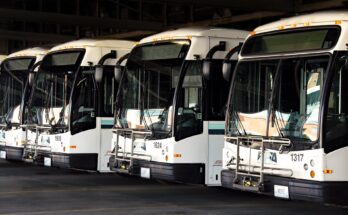The conundrum facing the firm charged with restructuring NJ Transit is to find $600 million in cuts while also identifying ways to help the agency evolve into a “comprehensive transit system” that meets the needs of modern-day straphangers.
The state is paying North Highland $6.7 million to conduct the study, which the company launched in January. It is expected to deliver “quick wins” in June, with a feasibility study report in late October or November.
Asked if the North Highland team has provided the month-five update of “quick wins” yet and if it will give an update to the public, NJ Transit spokesman John Chartier said, “There is no update on North Highland at this time.”
North Highland is trying to answer this central question: “What are the opportunities and next steps for NJT to become the ‘Comprehensive Transit System’ that the public expects even in midst of this challenging environment?”
That is what the consulting team said to the New Jersey Transportation and Treasury departments in its 154-page response to a request for proposals, part of a 214-page document withheld from the public for more than two months after NorthJersey.com first filed a public information request.
Contracts are supposed to be provided “immediately,” according to state law. In this case, the requested document wasn’t produced until after a significant fare hike proposal was approved by NJ Transit’s board, even though the main point of the study is to cut 20% of the agency’s operating budget.
NJ Transit President and CEO Kevin Corbett said the study is partly analyzing a “doomsday” scenario — cuts the agency could be forced to make if state aid, including a proposed corporate transit fee, isn’t passed by the Legislature in time for the July 1 budget deadline.
The other part of the study will examine potential agency improvements, good management practices it could adopt, and how it could change service to meet ridership in a post-pandemic commuter environment.
“What happens if we don’t get that money?” Corbett said in response to questions from senators and Assembly members during transportation budget hearings last month. “We have to be able to come back and say, ‘OK, if we don’t have this money, then we’re talking very dramatic potential cuts, certainly nothing that we want to do after working so hard to rebuild the transit system.'”
Five firms are involved in the assessment: Atlanta-based North Highland Co.; Washington, D.C.-based CPCS Transcom Limited; Houston-based Amey Consulting; Newton, Pennsylvania-based Loutel LLC; and Trenton-based MBI, a powerhouse New Jersey lobbying firm.
North Highland’s team will assess NJ Transit across three main categories: administration, operations and capital. Here is an overview of the issues the consulting firm will target in each of those fields.
This piece of the analysis will focus on the workforce, organizational design, procurement practices, use of technology, discretionary spending and revenue.
The workforce assessment will provide NJ Transit with a better understanding of the true number of employees needed in each area and what jobs might be automated. NJ Transit’s nearly 12,000-person workforce is the biggest area of costs for the agency.
The tech focuses will be applied to planning routes and collecting and using real-time data. NJ Transit currently provides no public data for cancellations of the three light rail systems or the agency’s 253 bus routes.
In addition, it is aiming to “enhance existing systems for improved performance and user experience,” which could help address data issues that have affected navigation apps offering real-time bus departure data and recent issues customers have reported with the app’s Departure Vision feature for real-time train information.
The operations section will focus on how to address “historical practices that can sometimes create added burden” on legacy transit systems like NJ Transit, with the goal to improve service.
“An external perspective can be helpful in challenging the status quo, and we see it as our role to get to the bottom of the ‘how’ and ‘why’ behind existing service operations,” the proposal’s authors said.
Some specific issues they’ll explore: how long trains wait at each stop, how best to cycle equipment and conduct maintenance, what service changes could be made during peak and off-peak hours, how to ensure on-time performance, how to improve paratransit dispatch, how best to cycle through crews, how to improve accessibility, and how to improve efficiency with train platform assignments.
Another focal point will be how to address post-COVID ridership trends, such as longer peak travel times, as well as how congestion pricing could affect ridership, and “a more regionally distributed network that provides interconnectivity across a more dispersed set of origins and destinations,” instead of focusing on Manhattan, the proposal said.
The North Highland team will take a close look at NJ Transit’s assets and how best to manage them, including train cars and buses and property to house them.
Much like other legacy transit operators, NJ Transit has a mix of inherited outdated equipment and facilities along with some newer equipment and garages, including the electric bus fleet and garage in Newton. This has created a “complex web” and “can spiral into a chaotic environment of redundant inventory systems, obsolete stock, and operational inefficiencies,” the proposal said.
The analysis will aim to find redundancies and streamline inventory processes to cut costs.



